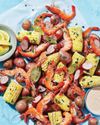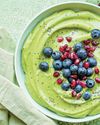
What exactly is composting, and how does it work?
Composting is the process of decomposing organic materials into rich, nurturing fertilizer. Materials are typically a mix of carbon-rich brown matter (straw, fabric, sawdust, wood chips) and nitrogen-rich green matter (grass clippings, coffee grounds, eggshells). The carbon and nitrogen found in compost is a critical food source for healthy microbes that allow for thriving soil.
There are four common methods: hot pile, cold, vermicomposting and electric cycling.
Hot pile, or aerobic, involves tossing green and brown matter into an open pile exposed to oxygen and water. This pile becomes “hot” (ideally 160°F) as bacterial microbes decompose the matter rapidly. However, overheating can cause mold or destroy healthy microbes, so you’ll need to flip the pile consistently to ensure even distribution of moisture and heat. This takes roughly six to nine months to produce fertilizer.
Cold composting, or passive composting, is a simpler but slower method. Just mix brown and green matter in your compost and let everything decompose into fertilizer over a year or two. However, while less work, this approach can lead to development of unpleasant smells, bacteria, fungi or parasites.
This story is from the {{IssueName}} edition of {{MagazineName}}.
Start your 7-day Magzter GOLD free trial to access thousands of curated premium stories, and 9,000+ magazines and newspapers.
Already a subscriber ? Sign In
This story is from the {{IssueName}} edition of {{MagazineName}}.
Start your 7-day Magzter GOLD free trial to access thousands of curated premium stories, and 9,000+ magazines and newspapers.
Already a subscriber? Sign In

Summer Lovin'
Bushels of berries, peaches, nectarines, cherries, plums and more beckon at the market. Buy them all and soak up the sun in these bejeweled desserts.

Into the Wild
Cooking along the 500-mile Colorado Trail taught Clean Eating editor Amanda M. Faison how to transform the campfire into a kitchen.
![[ Three Ways ] Tropical Punch [ Three Ways ] Tropical Punch](https://reseuro.magzter.com/100x125/articles/6144/994436/qSC8RoLOC1657772079105/crp_Hibiscus-Jamaican-sorrel-Recipes.jpg)
[ Three Ways ] Tropical Punch
Of African origin, hibiscus or Jamaican sorrel, is an important staple in West Indian and Mexican cooking. Hibiscus is sour enough to make you pucker and tropical enough to evoke the islands. Popularly brewed as a tea, the dried petals play well in savory or sweet recipes, too.

You Had Meat Tacos
"When it's done properly, taco should be a verb," declared Jonathan Gold, the late restaurant critic of the Los Angeles Times. Tacos are much more than a meal; they're an action.

The Multitasker
Collagen usually makes headlines for its skin-saving benefits. But did you know that it's also an essential nutrient for joint health? (Especially if you sit at a desk all day.)

The Minimalist
Summer cooking is all about fresh and fast and avoiding the stove.

Lighten Up
If you've had an air fryer in your online cart since the start of the pandemic, it's time to commit. Let's just say it'll change your life.

JUST RIGHT
The classic low-country boil is a celebration of place, tradition and ratio.

Recovery Days
The mantra that food is fuel is gold, but food as refuel is equally valuable.

Lower your impact without sacrificing satisfaction.
Eat like a Reducetarian.